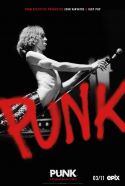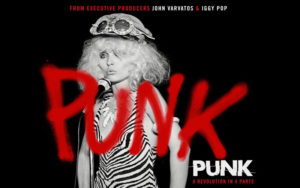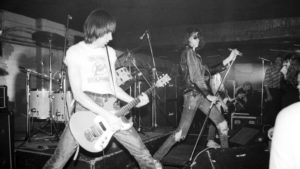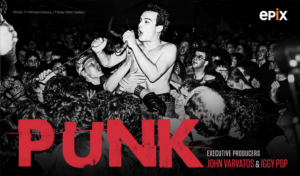 When Vancouver-based documentary filmmaker Jesse James Miller undertook a four-hour docuseries about the history of punk rock, he determined to inundate himself in research about the musical genre, as he had not been previously associated with punk and its notable figures. “They hired someone out of the fold,” he said of the show’s producers, gearing the series towards broadcasting via the Epix premium cable service. “That was the intention: to go that way—I brought a totally different perspective. My attack on a story is a lot different than somebody who is part of the scene.”
When Vancouver-based documentary filmmaker Jesse James Miller undertook a four-hour docuseries about the history of punk rock, he determined to inundate himself in research about the musical genre, as he had not been previously associated with punk and its notable figures. “They hired someone out of the fold,” he said of the show’s producers, gearing the series towards broadcasting via the Epix premium cable service. “That was the intention: to go that way—I brought a totally different perspective. My attack on a story is a lot different than somebody who is part of the scene.”
From the outset, the series, eventually titled with the simple moniker Punk, was oriented towards four one-hour episodes. “It was always a series,” Miller explained. “It hadn’t been done that way before. That was the producer’s original pitch. We did a lot of prep on each episode—you carve out how each episode would begin, middle and end.”
Chronicling the early days of punk rock, featuring Iggy Pop — one of the series’ executive producers — with his band, The Stooges, in 1968, through the music’s late-1970s heyday and beyond, Punk was pre-assembled with a room full of writers, Miller included. “We beated out all the episodes,” delineated Miller of intensive writing sessions. “It’s still a documentary; you have all of your structures and skeletons. It’s episodic, no matter what you do.”

In pre-envisioning the series with the writing team, Miller was methodical in fabricating the framework of punk rock’s pivotal eras, while remaining flexible in adding new elements as they surfaced. “You are retelling stories and also digging for other things to come out of the woodwork,” he revealed. “The idea is to be as organized as possible, and then go out for things that come up.”
Critical to every writing session was Susanne Tabata, an aficionado of punk culture who also served as a consulting producer on the overall series. “Whenever we started working on a story pattern, ‘We need that person for that moment,’” Miller divulged of working with Tabata and four additional writers. “I come from a pretty organized background. With the schedules that you have in television, you have got to know what you are trying to get in each interview.”
Much shorter than typical schedules for extended series, Punk was delivered in under a year. “It’s part of the television model,” Miller stated. “Documentary filmmaking doesn’t fit comfortably into that. You write it, you figure out who [your interview subjects] are, your archival division works off of the script, and you go shoot it.”

Naturally, the monumental bands and artists who revolutionized punk rock are included in the show: The Clash, The Ramones, The Sex Pistols, and the aforementioned Iggy Pop. “We interviewed him first,” Miller remarked of the Detroit punk godfather. “He was huge. Once you hear his name, that validates it. He was amazing: musician, person, interview, guy. He affected the whole tone of the piece.”
Though many original punk rockers have passed on, sadly and amazingly including all four original Ramones, Miller was able to track down many of the remaining legendary musicians who shocked the world with their raw energy and unbridled anger expressed in the music. “Everybody fell into place,” said Miller. “Johnny Rotten was amazing and a wonderful guy. Everybody came to the table with some unique perspective. We did 61 interviews—I was grateful for every one of them.”
From Vancouver, Miller and his crew of five travelled the world to interview Punk’s main participants, including stints in London, Detroit, Miami, plus Los Angeles and New York three times each; to catch Joan Jett, they met her on tour in Sydney. Creative producer Eric Maran led the team, which also included cinematographer Shaun Lawless, who shot all of the episodes with assistant cameraman Scot Proudfoot. Brent Calkin ran the boom mike and served as location sound mixer. “It is about experience, but it’s also about being prepared,” said Miller of location shooting. “That’s what filmmakers pride themselves on.”

Throughout an ‘uncomfortably tight’ post-production period, Miller deferred to lead editor Graham Kew and editor Greg Ng to fashion the four episodes. “They are masters—give them their space,” Miller noted about his collaborations in post. “At the end of the day, it’s my job to protect them to get their work done. In terms of time, allowing them to have the space needed to create more than what is just on paper. In documentary, there are no guidelines—you allow that creative element, to be relaxed about it. I have no problem saying that I’m a showrunner. It’s a different mindset than just directing; you are running all of these departments to the finish line.”
Until the last two months of post-production, Miller was still in production, mandating that Maran create a strategic system of transcriptions to send to the editing room. “He was taking notes while I was interviewing,” Miller said. “It provided enough communications to the editors what we felt. In one day, I’ll have three interviews—each one is from a different episode. Eric was there enabling me: ‘Hey, am I missing this guy or this woman for episode three?’”
Working the entire time on the project was a revolving team of six people in Punk’s archival department. “They are working with the editors directly, and with us on the road,” Miller detailed. “They were in story meetings at the beginning and were given a script. They worked blindly for a while. The direction would come from the editors who were working on a moment—we would come across a character who said that they have a book or album of photos. There was a constant communication pattern between the road and post.”
 In the end, Miller was exceedingly pleased with his final four hours of content in Punk. “The thing that’s amazing about the series, in my opinion, was getting all of those people in the same film together,” he conveyed of the denizens he interviewed. “It’s kind of unheard of. Punk is a great lens into a genre that’s misunderstood and can make you think about the world of punk music a little more.”
In the end, Miller was exceedingly pleased with his final four hours of content in Punk. “The thing that’s amazing about the series, in my opinion, was getting all of those people in the same film together,” he conveyed of the denizens he interviewed. “It’s kind of unheard of. Punk is a great lens into a genre that’s misunderstood and can make you think about the world of punk music a little more.”
For more information, link to: https://www.epix.com/series/punk.





